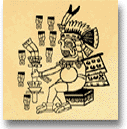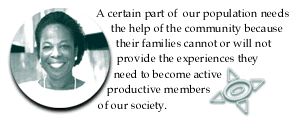|
• Mission & Overview
• Programs
• Curriculum
• Enrollment
• Faculty & Staff
• Community
• Links
| General Info | |||
|
|||
 Sandra Daley has a long history with UCSD. She received
Sandra Daley has a long history with UCSD. She received her medical degree from the university, trained in her subspecialty at UCSD Medical Center, and is now associate clinical professor of pediatrics at her own alma mater. Her commitment to UCSD does not stop at her own doorstep. Daley is active in recruiting Latino and African-American students to attend UCSD and helps to see that these students are retained by the university. Daley is experienced in bringing people and agencies together to deliver health and social services in an efficient, cost-effective way in order to improve the lives of children and their families. She is known for implementing innovative, school-linked health care delivery models that address the tough issues of limited health care access. She works to introduce young doctors to the skills needed to work with individuals, groups, and agencies that are essential partners when dealing with problems in community settings. Q. What was it like to be a medical student at UCSD? A. Intense. When I started medical school, two years after completing my undergraduate degree, I was sure that I wanted to get an M.D. and Ph.D. With such an ambitious goal, I came prepared to dig in and work my tail off. So, the intensity. I was the first person in my family to attend college. No one was in a profession. So my only role models were people I read about, or the dreams that I dreamt. My advisers in college and graduate school were split on the question of whether to be an M.D. or a Ph.D. So, my student experience was an enlightening introduction to my future profession. Q. What is it like to be a faculty member at the school you once attended? A. Delightful, especially in my present role in recruitment and retention of disadvantaged students, because I came to the campus as a disadvantaged student myself. When a student describes a situation I experience, I am able to bring perspective. If he or she describes something new to me, I am able to listen, often empathize, and in most instances assist with problem solving. Since I practiced in a community clinic in San Diego for more than thirteen years, as well as taught pediatric residents with my colleagues in a hospital in Tijuana, my work as a member of the UCSD faculty is a perfect opportunity for me to use and transfer all the knowledge and skills I acquired during those thirteen years in a community setting.  Q. What led you to a career in pediatrics and innovative community health care delivery service? A. I believe that the world can be a better place. There's also the conviction that children, no matter who they are or where they come from, are our future. That said, I also have to add my experiences. Pediatrics was the one place where my patients accepted me without having to prove myself. When I walked into a room and was viewed with suspicion, it was because I wasn't that person's mother or father. Once we made friends based on how nonthreatening, calm, or generous I was, we were friends for as long as I stayed myself. I didn't have to insist that I was a doctor, or prove how wise I was, or explain why I talked with an accent (Spanish with a Caribbean lilt. I'm from Panama). In short, I could relax. My colleagues were equally pleasant to work with. They enjoyed play, so even though we were engaged in a discipline that is intellectually challenging, we did our work with a lightness of spirit that was a unique experience for me. Q. Would you encourage today's medical students to become active in community health care? A. Absolutely! Why? Because it is all around us. We live, work, are born, and die in community. Just as you learn to brush your teeth, why not learn how to do all of the above effectively in your community? Q. What community outreach projects are you now engaged in? A. One important outreach project is New Beginnings, an interagency community approach to solve education, health, and social service problems identified in the city of San Diego and the county. The collaborative project includes UCSD School of Medicine and Medical Center, San Diego Unified School District, San Diego County Department of Social Services and Public Health, San Diego Community College District, San Diego City Housing Commission, Head Start, and Children's Hospital. We have a demonstration site at Hamilton Elementary School in the mid-city area of San Diego. Q. Why recruit disadvantaged students? A. They are part of the community, are they not? They are not going away, they are here to stay and the Latino and Asian populations are growing. The poor as a group are growing and minorities as a group are nearly the majority in California and soon, the nation. A certain part of our population needs the help of the community because their families cannot or will not provide the experiences they need to become active, productive members of our society. Therefore, we, the active and productive members of society, must do it. Otherwise our children inherit a tremendous national debt. They inherit chaos. Q. What advice would you give students today? A. Set goals for yourself. I would ask them to think about what they want their lives to look like. How do they want their personal/work/professional life to be, in all its permutations? Their family life, their place of work, etc. Then close their eyes and dream what this looks like, how it feels, how they feel while they are living in this dream world. This is what it means to set a goal. Now that you know what your goal is, you are prepared to work diligently, honestly, and successfully to achieve it. Then I would say, good luck and call me if you think I can help. [ Top ] |